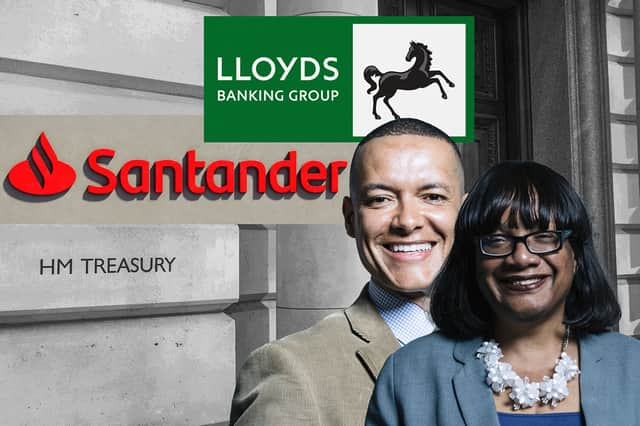Exclusive:Bank profits: windfall tax could raise up to £14 billion from HSBC, Barclays, Lloyds, NatWest, campaigners say
and live on Freeview channel 276
A windfall tax on banks' whopping profits could raise up to £14 billion for the exchequer, analysis from Positive Money claims.
Ahead of the Spring Budget, with reports that certain departments' spending could be trimmed to pay for tax rises, the campaigners say that taxing banks' record profits from high interest rates could be one way to boost ailing public services. This week, HSBC, Barclays, Lloyds and NatWest have announced a combined £44 billion of pre-tax profits. These are four times higher than in 2020, according to the Positive Money, due to sky-high interest rates.
Advertisement
Hide AdAdvertisement
Hide AdSimon Youel, head of policy and advocacy at Positive Money, explained: “There’s nothing radical about a windfall tax on bank profits - even Thatcher understood that banks can and should bear the burden of fairer taxes when they’ve profited from higher rates.
“With talk of further austerity ahead of the Budget, we point to a windfall tax on bank profits as a clear and popular source of revenue for public investment. Given these record profits have come from the higher interest payments piled on a public already struggling under the weight of the cost of living, a windfall tax is not just the sensible choice, but the fairest one.”
Positive Money points to its polling from September, which found the majority of people supported a windfall tax on banks, with the government already putting in place a scheme for excess energy profits. It said that replicating the Thatcher government’s 2.5% levy on banks’ non-interest bearing deposits, introduced in 1981, would raise around £10.5bn.


More and more MPs have started calling for a windfall tax. Labour MP Clive Lewis previously told NationalWorld: “Banks’ bumper profits are being funded by public impoverishment. That’s the sign of an economic system that needs to change.
Advertisement
Hide AdAdvertisement
Hide Ad“Our economy is only as healthy as the members of the public who keep it going. Where is the public benefit of a highly profitable banking sector, if people can’t afford to put a roof over their head, or keep their small business running to serve a local community?
“In the long term we need more progressive wealth taxes and the break up of the banking industry, ensuring we have a mix of banks, including the creation of a healthy, localised banking industry that serves communities first. In the short term, we need to redistribute unearned profits from banks to the public through a windfall tax.”
While former Shadow Home Secretary, Diane Abbott, told NationalWorld: "The banks are clearly profiteering. This is contributing to the squeeze on the economy. Of course, there should be a tax on windfall profits, with the funds used to ease the cost of living crisis." The government has previously ruled out bringing such as levy, saying that it would risk jobs. Answering a question from Green MP Caroline Lucas last year, then City Minister Andrew Griffith said: "With millions of British jobs dependent on financial services, including an estimated 20,000 jobs in Brighton and Hove, I hope the honourable lady will join me in celebrating a sustainably profitable financial sector. It is only that that gives us the ability to invest in skills and technology."
Ralph Blackburn is NationalWorld’s politics editor based in Westminster, where he gets special access to Parliament, MPs and government briefings. If you liked this article you can follow Ralph on X (Twitter) here and sign up to his free weekly newsletter Politics Uncovered, which brings you the latest analysis and gossip from Westminster every Sunday morning.
Comment Guidelines
National World encourages reader discussion on our stories. User feedback, insights and back-and-forth exchanges add a rich layer of context to reporting. Please review our Community Guidelines before commenting.
